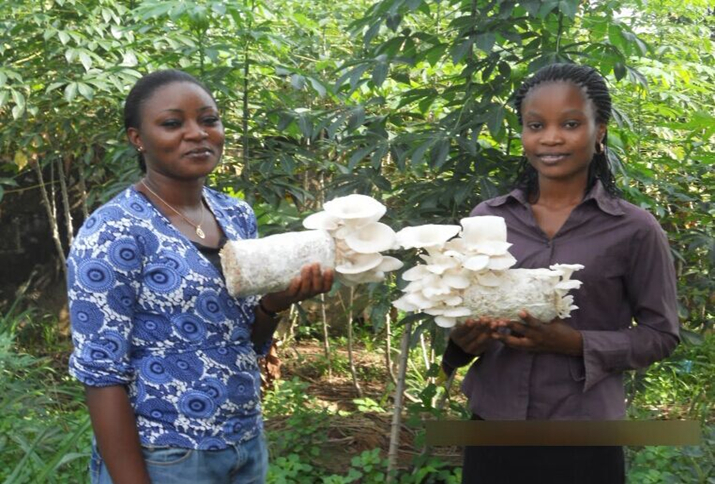|
|||||||||||
|
|
| When Good Deeds Mushroom |
| Chinese agricultural experts help to develop Africa's edible fungi industry |
| By Cui Xiaoqin | VOL. 8 JANUARY 2016 |
 |
|
The mushroom is eaten widely in many African countries |
The division is one of the six edible mushroom cultivation hubs in south Nigeria, established through the efforts of Chinese agricultural experts. One of them, Zheng Aibao, was appointed as an expert for growing mushrooms and research by Nigeria's Ministry of Science and Technology in September 2005.
The division at Bayelsa has several areas. The mushroom spawns are produced in one; then they are transferred into a substrate like compost or straw. Then the mushrooms are picked and processed. A variety of mushrooms are grown, from the oyster mushroom and agaric to the Glossy Ganoderma. Zheng said quality construction and standardized operations are key to developing the mushroom industry.
Dishing it out
Edible fungi have great potential in Nigeria's local market. "The locals in south Nigeria collect wild mushrooms growing by the roadside and sell them," Zheng said. "Mushroom dishes are everywhere - on families' dining tables and even in fast-food restaurants. It indicates the locals have a habit of eating mushrooms."
Zheng learned that people sometimes ate poisonous mushrooms by mistake and the stray incidents led to fears about eating fungi. "Since we initiated the edible fungi cultivation project, farmers can grow their own mushrooms, ensuring quality and safety and overcoming the mental block that it could be dangerous to eat mushrooms," Zheng told ChinAfrica.
Oyster mushrooms, processed in Chinese agricultural experts' drying machine, have a long shelf life. So besides being eaten domestically, they are also exported to South Africa and other African countries.
|
|
|
Zheng Aibao (left) explains the finer points of mushroom cultivation to Nigerian farmers |
Chinese experts have trained 50 people in edible fungi cultivation for Nigeria's Ministry of Science and Technology. The first batch to be trained in August 2006 comprised 12 officers from the National Biotechnology Development Agency under the ministry.
The participants showed great interest, participating in hands-on procedures such as sterilization. The four-month training was extremely fruitful.
The Chinese experts taught Nigerians to grow the varieties suitable for Nigeria's hot climate so as to save costs and improve economic efficiency.
After finishing his stint in Nigeria in 2014, Zheng joined the team of senior agricultural experts to Ethiopia. Under the International Exchange Center of China's Ministry of Agriculture, the team of experts was sent to develop Ethiopia's edible fungi industry.
Zheng found Ethiopia to have all the basic conditions for growing mushrooms. The climate was excellent and there was a wide range of raw materials as well as an abundant workforce. But the Ethiopian farmers, despite their high enthusiasm, lacked practical technology.
Genet Kebele, a farmer from Ethiopian Capital Bureau of Agriculture, was a case in point. Kebele had only one room with poor light and ventilation, and the window covered with a black plastic sheet. The dry indoor air hampered the growth of the fungi, leading to poor yield. Chinese agriculture experts introduced strict aseptic techniques so as to ensure safety and a good crop of edible fungi, as well as zero pollution in the production process.
Zheng is confident that the edible fungi industry can take off in Africa.
Laying the groundwork
"Although the scale of the industry in Africa is not large enough at present, yet the government attaches great importance [to its development], and the trained farmers are working assiduously," he told ChinAfrica.
Zheng is also confident of the cooperation between China and Africa in edible fungi cultivation. He said a number of qualified and skilled African technicians have been trained by Chinese experts and this has laid the groundwork for large-scale sustainable development of the edible fungi industry in the future.
If African governments at all levels provide financial support to qualified farmers, Zheng foresees a healthy development of the edible fungi industry.
|
|||
| Copyright ChinAfrica All right reserved 京ICP备08005356号 |